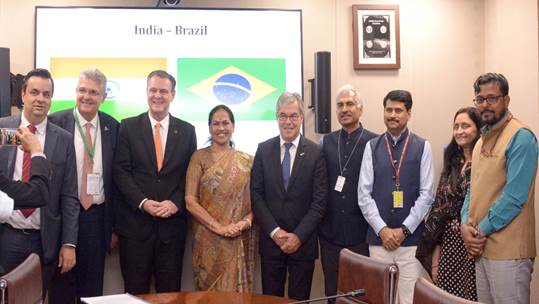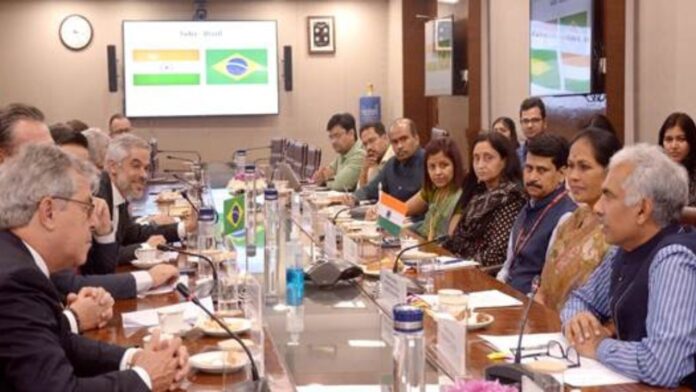Both countries have a flourishing bilateral agriculture trade and further cooperation can be strengthened in food processing, agro-industry, agricultural research and development: Shobha Karandlaje
Minister of State for Agriculture and Farmers’ Welfare Sushri Shobha Karandlaje interacted with the Brazilian delegation led by Minister of Agriculture, Livestock and Food Supply Mr Carlos Favaro today. At the outset, Sushri Shobha Karandlaje extended a warm welcome to Mr Carlos Favaro.
MoS Sushri Shobha Karandlaje showed gratitude for supporting the Indian Presidency during the G20 Agriculture Working Group Meetings and expressed regret for the Minister’s absence and inability to attend the G20 Agriculture Minister’s Meeting at Hyderabad. She expressed happiness that the visit would further strengthen India-Brazil’s rapidly growing cooperation in the agriculture sector. She said that both countries have a flourishing bilateral agriculture trade, and further cooperation can be strengthened in food processing, agro-industry, and agricultural research and development.
Sushri Shobha Karandlaje further said that the demand for avocados is growing in India, which provides an opportunity for India to import avocados from Brazil. She assured that India will extend its full support to Brazil for a successful G20 Presidency. She also expressed happiness that Brazil is establishing a task force, the Global Alliance against Hunger and Poverty, which aligns with the India Presidency’s Deccan High-Level Principles on Food Security and Nutrition align with this task force.
Mr Carlos Favaro thanked India for a friendly reception and conveyed warm greetings from President Lula. He underscored Brazil’s strong commitment to enhancing relationships within the BRICS framework with the Global South and the Middle East. Brazil prioritizes environmental protection while emphasizing that environmental concerns should not hinder international trade. Brazil articulated its intent to increase food production and expand its agricultural area without resorting to deforestation or harming the environment.
Mr Carlos Favaro emphasized that Brazil and India face similar challenges in the agricultural sector, and hence, both countries can find standard solutions to mitigate these challenges. The fight against hunger is a paramount focus for Brazil, and they expressed a desire to collaborate with India through technology transfer, knowledge sharing and cooperative efforts with India to fight hunger.
Brazil anticipates receiving India’s specific interests and demands, which can be addressed at the institutional level by both countries. The promotion of bilateral trade was highlighted with Brazil’s willingness to open its market to various agricultural products and expedite Sanitary and Phytosanitary (SPS) related negotiations to facilitate trade.Brazil’s delegation extended an official invitation to India for the forthcoming 2024 G20 presidency.
Other members of the Brazilian delegation shared insights into their agricultural best practices, including the use of drip irrigation in the horticulture sector, underscoring the importance of collaboration in fruit production.
The president of Apex Brazil shared that the existing trade relations between India and Brazil need to be commensurate to the potential of both nations. Apex Brazil is undertaking a mapping exercise of investment opportunities in both countries and encouraged the Ministry of Agriculture and Farmers’ Welfare to provide their insights.
Concluding the session, the Secretary of the Department of Agriculture and Farmers Welfare mentioned the possibility of forming a joint working group between the Department of Agriculture and Farmers Welfare and the Department of Animal Husbandry and Dairying to facilitate more efficient future discussions with Brazil. They also outlined plans to compile a list of collaboration points, which Brazil would also do in parallel. India will appoint a senior officer to lead the development of the relationship, with the creation of agenda points for the effective implementation and monitoring of actionable items. They aim to identify common issues and areas for collaboration promptly.


 हिंदी
हिंदी






